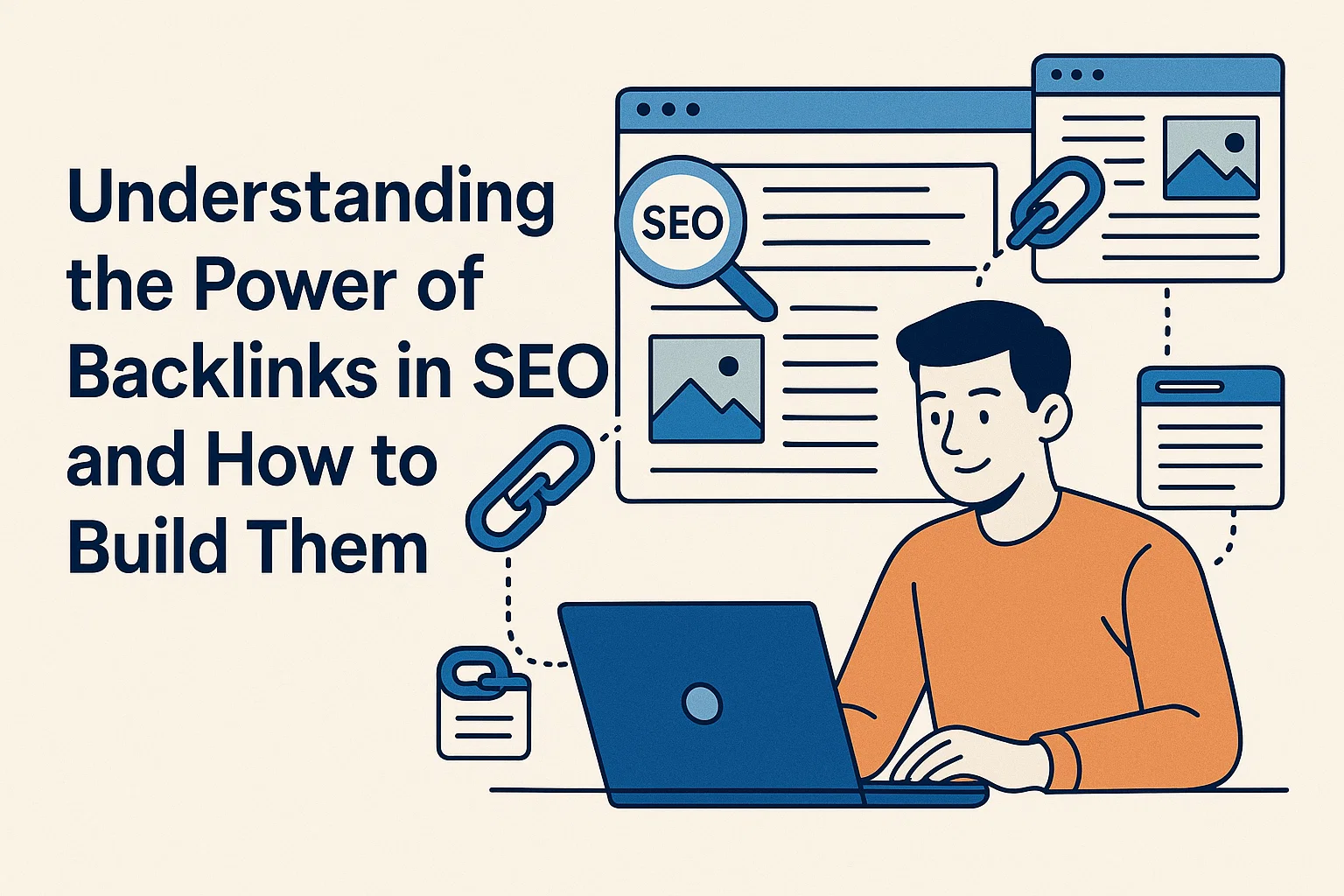In the ever-evolving world of search engine optimization (SEO), backlinks remain one of the most influential factors for improving website rankings. But what exactly are backlinks, and why are they so critical to SEO? In this blog, we’ll explore the power of backlinks in SEO, how they impact, and the most effective strategies for building them.
What Are Backlinks?
A backlink is a hyperlink on another website that points to your site. They’re also referred to as inbound links or incoming links. Search engines like Google consider backlinks as a signal of trust and authority. In simple terms, when a reputable website links to your content, it’s like they’re vouching for your credibility.
Backlinks are an essential aspect of SEO because search engines, particularly Google, use them as a ranking factor to determine how valuable or authoritative your website is. The more quality backlinks you have, the more likely you are to rank higher in search engine results pages (SERPs).
Why Are Backlinks Important for SEO?
Backlinks are often compared to “votes of confidence” for your website. Here’s why they’re so valuable in SEO:
- Improved Search Engine Rankings
Backlinks are one of the primary factors search engines like Google use to rank websites. When a high-authority site links to your page, it signals to search engines that your content is trustworthy and valuable. This can lead to higher rankings in search results, making it easier for potential customers to find your site. - Increased Organic Traffic
Quality backlinks help drive organic traffic to your website. When users click on a link from a reputable site, they’re more likely to engage with your content, especially if it’s relevant to their search intent. More organic traffic means more exposure and a greater chance to convert visitors into customers. - Credibility and Trust
When authoritative websites link to your content, it boosts your site’s credibility and trustworthiness. Websites that gain backlinks from trusted sources are often seen as more authoritative, which can improve brand perception. - Faster Indexing by Search Engines
Backlinks also help search engines discover your website faster. When a search engine crawls a site that links to yours, it finds your page more easily, which can speed up the process of indexing your content and improving your ranking.
The Different Types of Backlinks
Not all backlinks are created equal. There are various types of backlinks, and understanding the differences can help you focus on the right kind:
- DoFollow Backlinks
These are the most valuable type of backlinks. When a backlink is “do-follow,” it tells search engines to pass on link equity (or “link juice”) to the linked page, helping improve the SEO of that page. These are the backlinks you want to target. - NoFollow Backlinks
No-follow links do not pass on link equity, meaning they don’t directly impact your SEO rankings. However, they still provide referral traffic and can help diversify your backlink profile. For example, no-follow links from social media, forums, or blog comments may not affect rankings, but they’re still useful for generating traffic and brand awareness. - Editorial Backlinks
These are natural backlinks that you earn because your content is valuable and relevant. For instance, when a blog mentions your content in a post and links to it, this is an editorial backlink. These types of backlinks are among the most authoritative because they are earned rather than artificially created. - Guest Post Backlinks
Guest posting is a widely-used strategy where you contribute a blog post to another website in exchange for a backlink. These backlinks can be very powerful if you contribute high-quality content to reputable websites within your industry. - Directory Backlinks
Directory backlinks come from websites that list businesses in specific categories. While these links can help with local SEO, it’s important to focus on high-quality, trusted directories rather than low-quality link farms.
How to Build Backlinks in SEO: Strategies for Success
Building high-quality backlinks requires a strategic approach. Below are some effective methods to help you acquire backlinks that will boost your website’s SEO:
1. Create High-Quality, Shareable Content
The foundation of any successful backlink strategy is content. If your content is valuable, informative, and shareable, other websites are more likely to link to it. Creating content that answers specific questions or provides unique insights will make it stand out.
- Infographics: Visual content like infographics often gets shared widely and is more likely to be linked to.
- Long-Form Content: In-depth articles, research studies, or guides tend to attract backlinks because they provide comprehensive information on a subject.
- Interactive Tools: Tools, calculators, or quizzes can be valuable resources that others want to link to.
Tip: The more useful and shareable your content is, the more likely others will link to it.
2. Guest Posting
Guest posting remains one of the most effective ways to build backlinks. By writing articles for other blogs in your niche, you can insert a backlink to your website within the content or author bio.
- Target Reputable Blogs: Aim to write for websites that are well-established and relevant to your industry.
- Quality Over Quantity: Rather than posting on many low-authority websites, focus on fewer, high-quality sites with a large, engaged audience.
Tip: In your guest post, make sure the content adds value and aligns with the host site’s audience to increase the chances of your link being included.
3. Leverage Broken Link Building
Broken link building is a technique where you find broken links (404 errors) on other websites and offer your own relevant content as a replacement. This not only helps improve the user experience on the linking site but also gives you an opportunity to earn a backlink.
- Use Tools: Use tools like Ahrefs, Screaming Frog, or Broken Link Checker to identify broken links on websites in your niche.
- Reach Out: Contact the website owner and suggest your content as a suitable replacement for the broken link.
Tip: Ensure your content is highly relevant to the page that is linking out to improve the chances of getting the replacement link.
4. Engage in Influencer Outreach
Influencer marketing is not just about promoting products—it’s also about building relationships with influencers who can help promote your content. Reaching out to influencers in your industry and asking them to share your content or provide a backlink can be a highly effective strategy.
- Build Relationships: Engage with influencers on social media, comment on their blog posts, or share their content before asking for backlinks.
- Offer Value: When reaching out, make sure to provide value to the influencer—whether it’s through original content, collaboration, or resources they may find valuable.
Tip: Focus on micro-influencers or niche experts, as their audience is likely to be more engaged and relevant to your content.
5. Participate in Online Communities
Online communities such as forums, Facebook groups, Reddit, or niche-specific websites can be excellent places to earn backlinks. By engaging with these communities, answering questions, and sharing valuable resources, you can gain natural backlinks.
- Share Knowledge: Answer questions on forums like Quora or Reddit and include links to your website when appropriate.
- Join Niche Communities: Participate in discussions on industry-specific forums or groups where you can share content that adds value to the conversation.
Tip: Avoid spamming forums or groups with irrelevant links. Focus on offering genuine insights that naturally incorporate links to your content.
6. Collaborate with Other Websites
Collaborating with other businesses or content creators in your industry can lead to mutually beneficial backlinking opportunities. For example, co-hosting webinars, creating joint content, or working on shared projects can naturally lead to backlinks from the collaborating sites.
- Collaborative Content: Work together on blog posts, case studies, or whitepapers that can be published across both parties’ websites with mutual backlinks.
- Webinars and Events: Host online events or webinars and offer backlinks to participants’ websites in exchange for promotion.
Tip: Look for collaborations that are aligned with your business goals and target audience to maximize the value of backlinks.
Best Practices for Backlink Building
- Focus on Quality, Not Quantity: It’s better to have a few high-quality, authoritative backlinks than many low-quality ones. Aim for backlinks from relevant, trusted websites in your industry.
- Diversify Your Backlink Sources: Build backlinks from different types of websites, including blogs, directories, social media platforms, news outlets, and more.
- Avoid Black-Hat Techniques: Steer clear of unethical practices like buying backlinks or participating in link farms. Google penalizes websites using black-hat techniques.
- Monitor Your Backlink Profile: Regularly check your backlinks to ensure they are still active and relevant. Tools like Google Search Console and Ahrefs can help you monitor your backlink profile.
Conclusion
Backlinks remain one of the most powerful SEO factors for ranking on search engines. Understanding the power of backlinks and implementing effective strategies to build them is essential for improving your website’s visibility, credibility, and overall SEO performance.
At Speed Dot 360, we specialize in helping businesses with SEO services that drive organic traffic, improve rankings, and increase brand authority. Whether you’re just starting your website’s SEO or looking to improve your rankings, we can help you in every step of the process.
Frequently Asked Questions
Q1: What is a high-quality backlink?
A high-quality backlink comes from a reputable, authoritative website in your industry. It provides value to the user and is relevant to the content it’s linking to.
Q2: How many backlinks do I need to rank higher in Google?
There’s no magic number. The quality, relevance, and authority of the backlinks matter more than the quantity. Focus on getting backlinks from reputable sources in your niche.
Q3: Can I buy backlinks to improve my SEO?
Buying backlinks is a risky strategy. Google’s algorithm detects unnatural link-building tactics, and purchasing backlinks can lead to penalties that negatively impact your rankings.
Q4: How long does it take to see results from backlinks?
It can take a few weeks to a few months for backlinks to show results, depending on the authority of the linking website and the competitiveness of the keywords you’re targeting.
Q5: Should I focus on no-follow backlinks?
While do-follow backlinks are more powerful for SEO, no-follow links can still drive referral traffic and enhance your backlink profile’s diversity. It’s important to have a mix of both.





